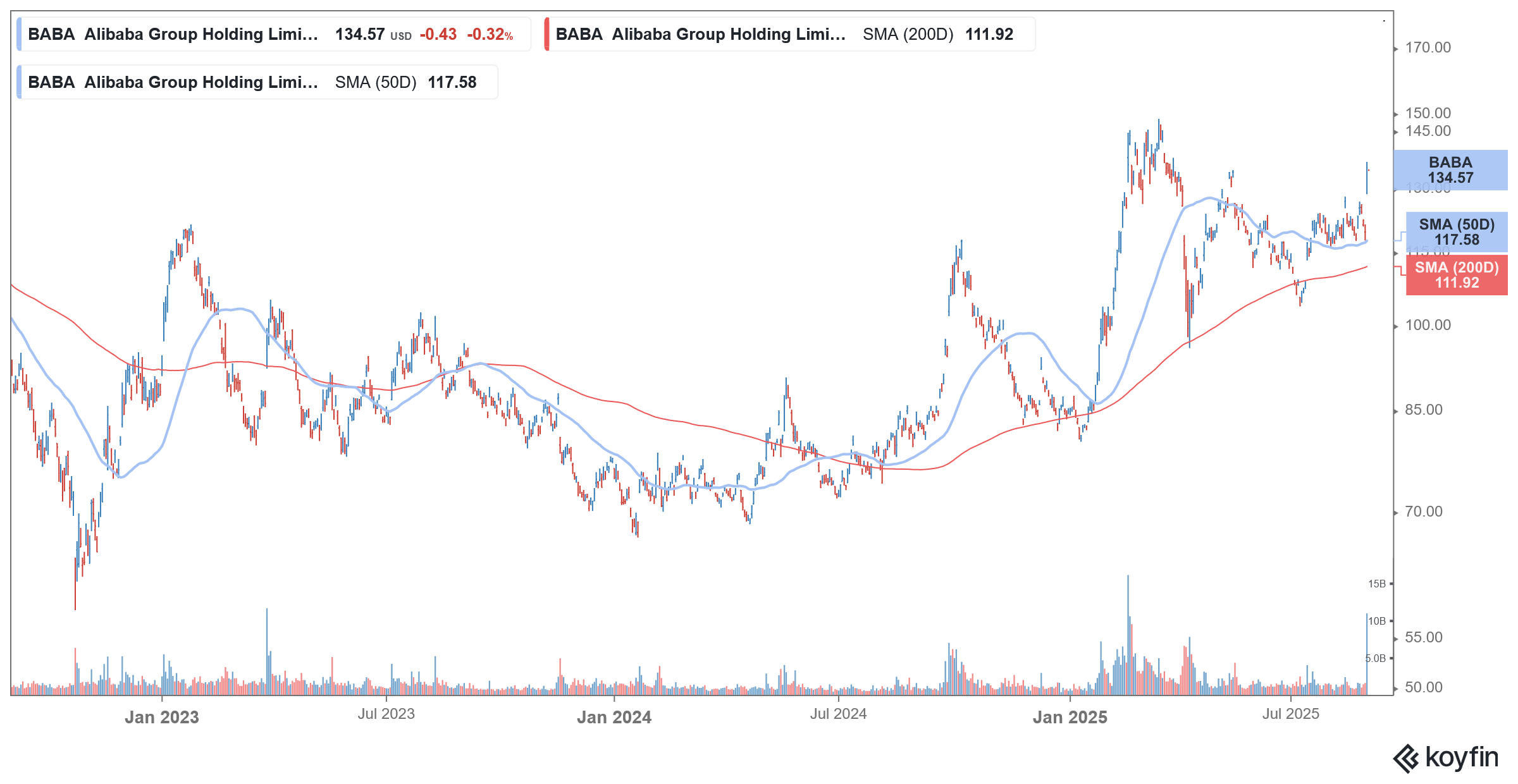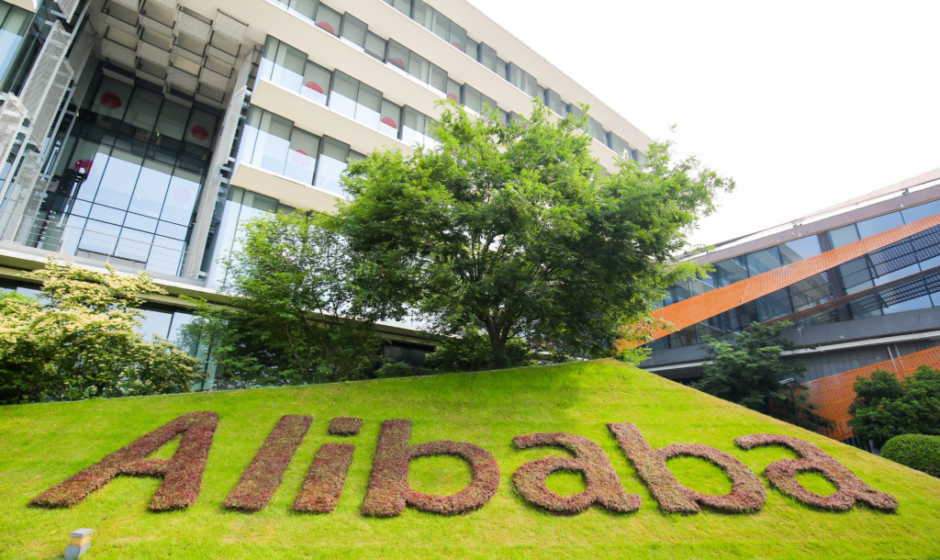Please note that we are not authorised to provide any investment advice. The content on this page is for information purposes only.
Alibaba stock (NYSE: BABA) soared on Friday after the company released earnings for its fiscal first quarter of 2026 that ended in June. Reports of the company developing an artificial intelligence (AI) chip also boosted sentiments, and several analysts raised their target prices.
Alibaba Reported Mixed Results
Consolidated revenue for the quarter was $34.57 billion, a 2% year-over-year increase, which fell short of estimates. Excluding the divested businesses of Sun Art and Intime, revenue would have grown by 10% year-over-year.
The company’s adjusted net income fell 18% year-over-year to $4.68 billion, while the GAAP net income rose 76% to $5.92 billion. This rise in GAAP earnings was primarily due to mark-to-market changes from equity investments and the gain from the disposal of Trendyol’s local consumer services business.
Key Takeaways from BABA’s Earnings
A major theme of the earnings call was Alibaba’s aggressive push into the AI and cloud computing space. The company’s management highlighted its commitment to a “user-first, AI-driven” strategy, with significant capital expenditure and a strategic portfolio centered on “AI + Cloud.”
Alibaba Cloud, the company’s cloud computing arm, showed strong momentum. Its revenue grew by 26% year-over-year, accelerating from the previous quarter. The company harped on the triple-digit year-over-year growth of its AI-related product revenue. This marks the eighth consecutive quarter of such growth, underscoring the strong market adoption of its AI solutions.
Analysts Raise BABA’s Target Price
Several analysts raised Alibaba’s target price following the earnings. Benchmark analyst Fawne Jiang raised Alibaba’s target price from $195 to $176 while maintaining a buy rating. Mizuho also raised its target price by $10 to $159 while maintaining its overweight rating.
While Bernstein analyst Robin Zhu said that the quarter was “mediocre,” he added, “For a company not always known for guiding concisely, this quarter felt like directional change.”
According to Zhu, “The plan going forward is clear: leverage food delivery, quick commerce, and AI to drive engagement across the company’s vast ecosystem.”
He added, “Our upgrade of Alibaba’s shares earlier this year during peak DeepSeek excitement was poorly timed. But our belief at the time – that AI investments would help steer Alibaba towards more gainful capital allocation – now appears to be taking shape.”


Alibaba Is Developing an AI Chip
Separately, reports suggest that Alibaba is developing an AI chip. This development is seen as a strategic effort to reduce the company’s reliance on foreign technology, particularly from US-based chipmaker Nvidia, and to bolster China’s push for semiconductor self-sufficiency.
The new chip, currently in testing, is designed for a broader range of AI inference tasks, which is the process of running AI models in real-world applications, as opposed to the more computationally intensive task of model training.
This is a crucial distinction, as it allows Alibaba to focus on the practical application of AI within its vast cloud ecosystem. The timing of this announcement is particularly notable, as it follows recent US export controls that have restricted the sale of advanced AI chips to China. While the Trump administration recently allowed Nvidia to resume some exports of its H20 chip, a version specifically designed for the Chinese market, Beijing has advised domestic firms to hold off on purchasing these chips due to security concerns. This has created a critical supply gap that Chinese companies are now scrambling to fill.
A key feature of Alibaba’s new chip is that it is being manufactured by a Chinese company. This marks a significant departure from the past, where Alibaba’s earlier AI processors were fabricated by Taiwan Semiconductor Manufacturing Company (TSMC), a firm that the US has since restricted from producing cutting-edge AI chips for China. This shift to domestic manufacturing is in direct alignment with China’s broader national strategy to build a homegrown semiconductor ecosystem and lessen its dependence on foreign technology.
Can Alibaba Challenge Nvidia with Its AI Chip?
The development of this new AI chip is not just a technological feat for Alibaba; it’s a strategic move with significant market implications. By developing its own hardware, Alibaba aims to secure its supply chain, avoid potential disruptions from geopolitical tensions, and maintain a competitive edge in its cloud computing and AI services. This effort is part of a larger trend in China, where companies like Huawei, MetaX, and Cambricon are also ramping up their own AI chip production.
For Nvidia, this presents a formidable challenge. While Nvidia has long dominated the Chinese AI chip market, the rise of domestic alternatives could threaten its market share. Alibaba’s new chip is reportedly compatible with Nvidia’s software platforms, which could ease the transition for developers and further encourage adoption
On multiple occasions, Nvidia has warned that the US chip export ban is counterproductive and would only spur innovation in China.
Alibaba Stock Trades Well Below All-Time Highs
While Alibaba stock has rebounded over the last year, it trades well below the record highs that it hit in 2020. That year, China cracked down on Alibaba, and it had to cancel the IPO of its subsidiary Ant Financial. The tech crackdown only worsened in 2021, and although Alibaba paid a record $2.8 billion fine to settle the antitrust case, markets were not too convinced that the worst was over for the company.
Ma wasn’t seen in public for several weeks after the cancellation of Ant’s IPO in November 2020 and appeared in an online interaction only in January 2021. Ma’s participation in the event with Jinping became all the more notable as the Chinese billionaire was the face of China’s tech crackdown.
Chinese shares were almost “untouchable” for US investors after the 2021 tech crackdown. However, over the last year, several hedge funds have taken an optimistic view of China and added positions in Chinese companies.
#Alibaba #Stock #Rallies #Reports #Chip #Key #Takeaways


